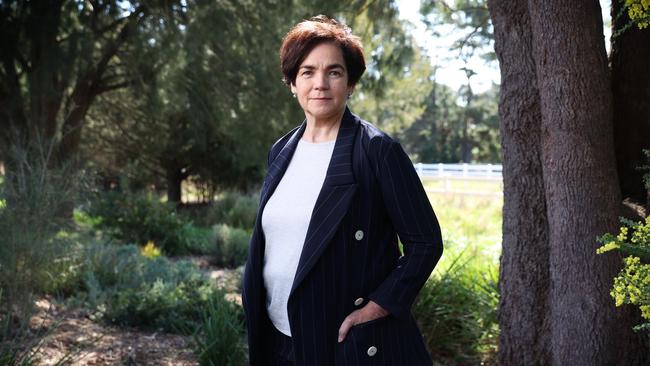Robodebt reckoning: ‘I was their scapegoat’, says former top public servant Kathryn Campbell
Former top public servant Kathryn Campbell believes she was ‘set up as the scapegoat’ over the Robodebt scandal and launched a blistering attack against a top-level investigation into her conduct.

You can now listen to The Australian's articles. Give us your feedback.
Former top public servant Kathryn Campbell believes she was “set up as the scapegoat” over the Robodebt scandal and launched a blistering attack against a top-level investigation into her conduct and Bill Shorten’s politicisation of the process.
Breaking her silence after her resignation from the public service following the damning findings of the Robodebt Royal Commission, Ms Campbell apportioned blame over the unlawful debt-recovery program to the Department of Social Services headed by then secretary Finn Pratt.
Ms Campbell, the former head of the Department of Human Services from 2011 to 2017, said she had made a mistake in trusting the DSS.
She also warned that the Robodebt episode – which targeted 430,000 welfare recipients from 2016 to 2019 – could result in government becoming “very risk-averse” and reluctant to implement reforms to service delivery.
The Australian Public Service Commission (APSC) found on Friday that a dozen former and current public servants, including Ms Campbell, breached the APS code of conduct 97 times through their involvement in the scheme.
The APSC report, following a 15-month probe, made six “substantiated allegations” against her, which followed referrals from the Robodebt Royal Commission, all of which she has rejected.
While acknowledging the “hurt and harm” experienced by victims of the scheme, Ms Campbell told The Weekend Australian: “I’ve respected the process. I respected the royal commission. I reject all the things that the royal commission said.
“I respected the public service, particularly the staff who worked on this review, to give them the opportunity to do the review thoroughly.
“It’s only in the last week … that I realised that not all the details would be released to the public.”
The six allegations against Ms Campbell which the ASPC found to be substantiated included a finding that she had failed to ensure the lawfulness of the scheme on three separate occasions.
Addressing the first occasion, Ms Campbell said Mr Pratt’s department had had responsibility for advising on the legality of Robodebt.
“The other department had told the government it was lawful. We were told we were fixing it, and so there was no reason to stop,” she said.
In relation to the second occasion, in which a legal academic raised concerns with the scheme at a 2017 conference, she said: “I prioritised the views of the secretary (Mr Pratt), rather than this person at a legal conference who I didn’t know.”
In relation to the third occasion, when she was found to have failed to have informed the government of academic and legal criticisms of the scheme, she said the concerns had been relayed by her colleagues.
“There was evidence that the minister’s office was told, but I didn’t personally tell the minister,” Ms Campbell said. “I had 35,000 staff. I had eight deputy secretaries. I did rely on those deputy secretaries telling the minister’s office things.”
Ms Campbell rejected the fourth allegation that she had created and allowed a culture that had prevented problems in the scheme from being properly considered within her department. She said the first time she had heard about such issues was during the royal commission hearings.
On the fifth allegation, that she had allowed the scheme to resume in August 2017 despite knowing there were issues with the debt-recovery process, she said: “We had put the improvements in place, to the minister’s satisfaction. The secretary of DSS (Mr Pratt) had told the government that it was operating within legislative requirements. And so the government didn’t take a decision to stop it.”
On the final allegation, that she had “failed to sufficiently respond to public criticism and some whistleblower complaints”, Ms Campbell was again defiant. “The evidence and the (APSC) found I did respond to whistleblowers, but didn’t stop the system. And it wasn’t my decision to stop the system,” she said.
However, the APSC also dismissed a key finding from the Robodebt Royal Commission that found Ms Campbell had misled cabinet.
The royal commission found Ms Campbell had directed staff to stop preparing legal advice regarding the scheme, and that she failed to discharge her legal obligations during the engagement of consulting firm PwC, which undertook a Robodebt review that was never finished.
Both claims were not substantiated by the APSC probe.
Four substantiated allegations were also made against Renee Leon – who succeeded Ms Campbell at the Department of Human Services from 2017 to 2020 – including that she failed to “expeditiously” inform the minister of the legal advice over the scheme’s lawfulness in mid-2019.
Ms Campbell and Ms Leon, along with another six ex-public servants, will not face sanctions by the APSC as they are no longer employed in the public service. But they will be required to disclose that they breached the code of conduct for public servants when seeking government work in the next five years.
Ms Campbell said she felt she had been scapegoated and that Government Services Minister Bill Shorten had elevated her role in the controversy at a press conference in November last year by saying she had “dreamed this proposition (Robodebt) up” alongside former prime minister Scott Morrison.
“I think that’s still happening,” Ms Campbell said.
“There had been ministerial comments from Minister Shorten about me and no one else. Just me. He drew parallels about problems with Morrison and I. He did try and connect me to Mr Morrison. So I thought there was a bit of an angle there.”
Mr Shorten rejected Ms Campbell’s claims. “The term scapegoat first appears in the Bible at the Book of Leviticus, where a goat would be released into the wilderness bearing all the sins of the community,” he said.
“In modern days, a scapegoat is a person who is wrongly blamed for the wrongdoings, mistakes or faults of others.
“You are not the scapegoat, Ms Campbell. The real scapegoats for Robodebt were the 430,000 Australians who were wrongly blamed and had unlawful debt notices raised against by the most powerful institution in Australian society – the commonwealth government.”
Ms Campbell said the DSS had “jealously guarded” the Robodebt legislation it was “responsible for”.
Asked why Mr Pratt had not been a focus of the investigations into Robodebt, Ms Campbell said: “He’s a really nice bloke. You know, he’s very well loved in Canberra, very well loved by the Labor Party.”
The Australian attempted to reach Mr Pratt for comment on Friday.
While admitting that the rollout of the scheme in 2016 was “poor”, Ms Campbell said she should have, in hindsight, “not trusted” DSS’s advice and obtained her own.
“I deeply regret not having now gone and got my own advice, because I didn’t realise that theirs was wrong,” she said.
Ms Campbell also warned that the APS could be cowed and become “very risk averse”.
“It will deter people from working on contested policy … and possibly service delivery because the disclosure today is all about service delivery. It’s not about the policy,” she said.
“If you get the policy wrong, you get away with it. If you get the service delivery wrong, you get all your details disclosed and I think that could be a problem for service delivery.”
In a statement, Ms Leon, now vice-chancellor of Charles Sturt University, defended her record, saying she was “proud to have played a key role in ending Robodebt”.
Of the further 10 public servants who breached the code, four were still employed in the public service, the APSC said, and would face a range of sanctions including demotions, reprimands and fines.
“Robodebt was a shocking betrayal and failure of empathy towards vulnerable people who needed support from the government,” Mr Shorten said on Saturday.
Referencing Ms Campbell, he said: “We’ve seen one of the key central actors in the tragedy of Robodebt, yet again in my opinion, fail to show empathy to the victims ...
“The real scapegoats were the people for whom their government broke the law to raise debts against them.”
“The reality is, the attacks on 430,000 people using welfare were political. The politics wasn’t against the Coalition government, it was by the Coalition government. They thought they could get away with welfare shaming, with poor shaming,” he said.




To join the conversation, please log in. Don't have an account? Register
Join the conversation, you are commenting as Logout